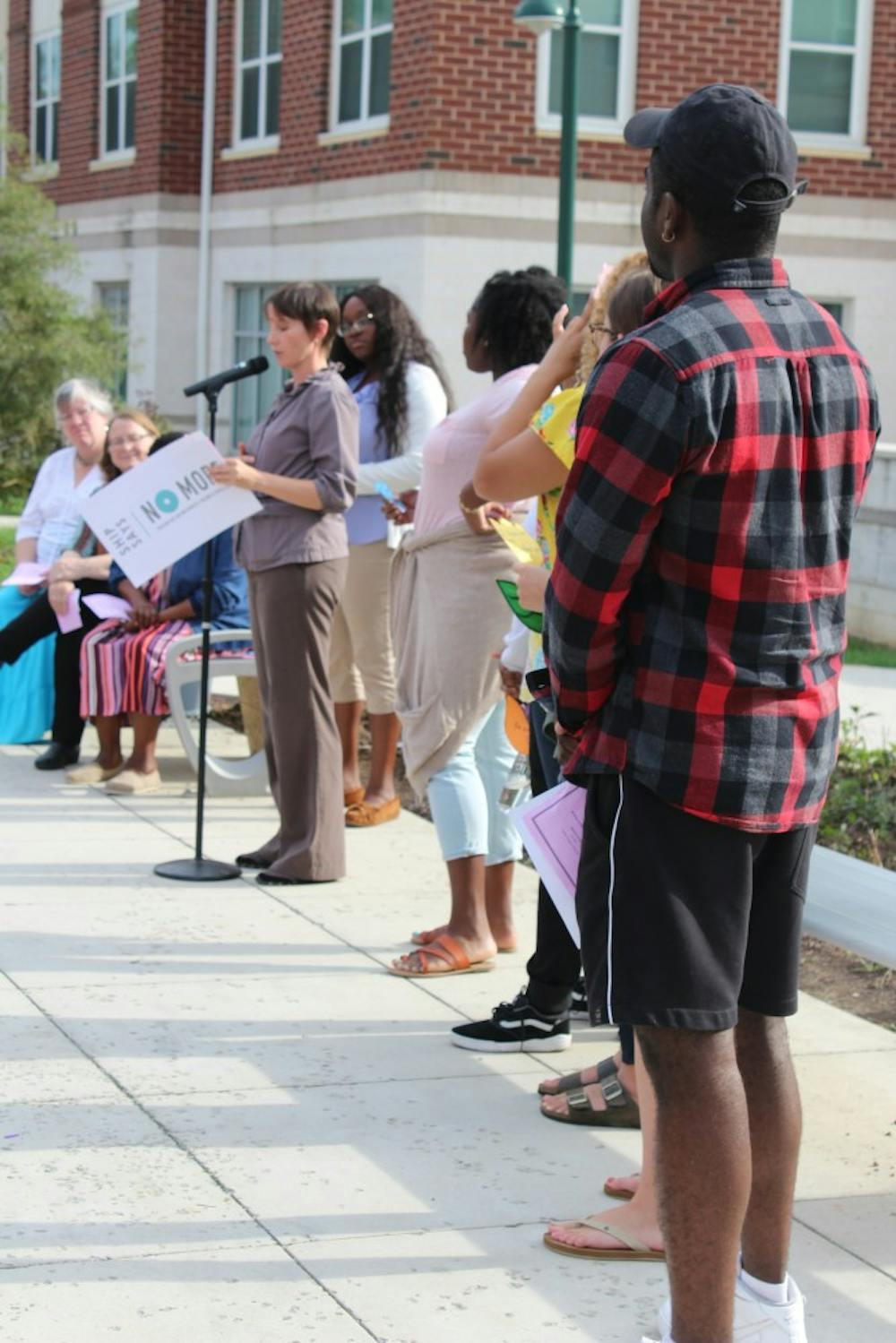Shovel in hand, Roneka Jones, intern at Shippensburg University’s Women’s Center, blanketed tulip bulbs with a layer of soil in the Janie Fecker Garden by Lackhove Hall last Tuesday for SU’s annual tulip planting ceremony.
The bulbs, which must endure the harshness of winter before breaking through the soil in beautiful bloom, symbolize endurance and hope for victims of domestic violence and sexual assault.
“They represent planting something but not being able to see the beauty of it for a long time,” said Stephanie Erdice, director of the SU Women’s Center. “And I think that is the situation for a lot of folks who have been in domestic violence situations, because there is hope for something better, but they cannot always tap into that hope right away.”
In addition to planting tulips at the ceremony, students were encouraged to speak out in behalf of someone they knew who has dealt with domestic violence by writing strengthening words on a colorful paper tulip. In an anonymous note addressed to “all women,” one tulip read, “The mind of a woman is to be treasured not toyed with, the spirit is to be embraced not broken, and the body is to be loved not beaten.”
These single messages then became a garden of inspirational flowers as they were pasted on a poster, so that all could read them and find hope. During the ceremony, several students banded together to hold the poster as speakers Jones, Erdice, Kim Mallory from Women in Need, United Campus’ the Rev. Jan Bye and students from SU’s Social Work and Gerontology Department shared a few uplifting words.
The poster is now hung on display in Horton Hall outside of the Women’s Center (Rooms 132 and 133).
Students who did not attend the tulip planting ceremony can still stand in support of victims of domestic violence and sexual assault on social media by participating in SU’s #ShipSaysNoMore photo contest.
Ship Says No More began in 2013 as a public relations campaign to combat sexual assault on campus. It has since grown into a round-the-clock campus resource for advocacy, reporting and support after Gov. Tom Wolf awarded it a $27,000 state grant in 2016, according to an SU news release.
Students and faculty can partake in the month-long contest by either taking a picture of themselves or a group of friends holding a Ship Says No More sign, which can be picked up in the Women’s Center. By taking a picture with the sign, participants are taking the “No More” pledge against domestic violence and sexual assault.
To be entered in the photo contest for a chance to win, the taken picture must then be posted on social media platforms using #ShipSaysNoMore or emailed to womenscenter@ship.edu. Winners will be selected on the last day of Domestic Violence Awareness Month — Oct. 31.
“People that are affected by [domestic violence and sexual assault] who may not feel comfortable to speak out and say that they are, can hopefully find comfort in those who take the #ShipSaysNoMore pledge because it shows that they have a large support group, even if they don’t know it,” Jones said. “To see that you have an ally within students and organizations on campus, even if it is just behind-the-scenes, can be reassuring for many victims, and I think that that’s what students appreciate most about the Women’s Center.”
Similar to SU’s “No More” initiative, during the tulip planting ceremony, Mallory introduced a new social media campaign that the National Resource Center on Domestic Violence (NRCDV) will run throughout the month of October, called #1Thing. Through #1Thing, the NRCDV hopes to promote the significance of being a part of the equation — Awareness + Action = Social Change — to end domestic violence, according to its #1Thing Action Guide.
“I think that we think of things like violence as enormous, and they are enormous, so we think that we cannot help solve the problem, so why waste our time?” Erdice said. “And if everyone thought that way, which they have for decades, then the problem doesn't get solved.”
However, if everyone tries to make the problem relevant to their own lives by thinking about how this issue may have once affected their sister, mother or friend and does one little thing in response, rather than assuming someone else will take action, in time, the collective efforts could create a ripple effect and lead to social change.
“Knowing is part of ‘one thing.’ Knowing resources, knowing signs, just really being educated can move us toward ending this abuse. So students going to visit the Ship Says No More website (https://www.ship.edu/no_more/), that’s ‘one thing.’ Students taking a picture with the no more signs, that too is ‘one thing’ that they’re doing,” Erdice said. “You don’t have to do a fundraiser; that’s not necessarily the one thing we are talking about. Sure, it’s great to participate in things like that, but those ‘one things’ can be a lot smaller.”
Standing up against issues like domestic violence and sexual assault may be intimidating for some as they do not know how to start the conversation or what to say, but resources like the Rape, Abuse & National Incest National Network (RAINN) and The National Domestic Violence Hotline provide tips and support for bystanders, who can be a voice, advocate or friend to someone in a domestic violence situation. Sometimes that is all a victim needs — someone to remind them that they are not alone.
Mallory ended her brief address to students during the tulip planting ceremony with a reflective question that all people can ask themselves and others, not only this Domestic Violence Awareness Month, but also year-round, to prompt and inspire change — “What one thing can you do?”


The Slate welcomes thoughtful discussion on all of our stories, but please keep comments civil and on-topic. Read our full guidelines here.